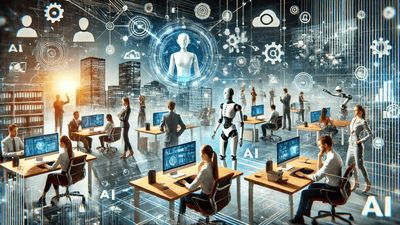
Understanding AI in the Workplace
Definition of AI
Artificial intelligence refers to the simulation of human intelligence in machines programmed to think like humans and mimic their actions. AI technologies include machine learning, natural language processing, computer vision, and robotics. These technologies can analyze vast amounts of data, recognize patterns, and make decisions with minimal human intervention.
The Growing Adoption of AI
The adoption of AI in the workplace is accelerating rapidly. According to various studies, a significant percentage of companies across industries are integrating AI to improve operations, enhance customer service, and increase efficiency. From manufacturing to finance to healthcare, AI applications are becoming more prevalent and sophisticated.
How AI is Replacing Jobs
As AI technologies advance, they sometimes render specific jobs obsolete. Jobs that involve routine, repetitive tasks are particularly vulnerable to automation. Here are some sectors where AI is replacing traditional roles:
1. Manufacturing
In manufacturing, AI-driven robots and automation systems can perform tasks that were once carried out by human workers. This includes assembly line work, quality control, and packaging. Companies such as Tesla and General Motors are leading the charge in automating production processes with AI technologies.
2. Retail
In retail, AI applications like automated checkout systems and inventory management solutions have emerged. Amazon Go stores, for instance, use AI technology to allow customers to shop without cashiers, relying on sensors and computer vision to track purchases. This technology can significantly reduce the need for traditional cashier roles.
3. Customer Service
AI chatbots and virtual assistants are increasingly handling customer inquiries and support requests. Companies like Zendesk and ServiceNow have developed AI technologies that can resolve simple customer issues, leading to a reduction in the need for human customer service representatives.
4. Finance and Accounting
In finance, AI algorithms can analyze large datasets, generate reports, and even execute trades more efficiently than human analysts. Companies like Bloomberg and IBM are utilizing AI to streamline financial reporting and compliance tasks, potentially displacing traditional roles in accounting and finance.
5. Transportation
The transportation sector is witnessing a surge in the development of autonomous vehicles powered by AI. Self-driving trucks and delivery vehicles have the potential to replace drivers in logistics and transportation, leading to concerns about job loss in these areas.
How AI is Augmenting Jobs
While AI does replace some jobs, it also creates opportunities for job augmentation. Rather than fully automating tasks, AI can enhance human capabilities, enabling employees to perform their roles more effectively. Here are ways in which AI is augmenting various jobs:
1. Enhanced Decision-Making
AI technologies can analyze data and provide actionable insights, supporting employees in decision-making processes. For instance, in healthcare, AI can help doctors diagnose conditions by analyzing medical data and suggesting treatment options. This collaboration enhances the quality of care provided to patients.
2. Personalized Customer Experience
AI tools allow businesses to offer personalized experiences for customers. In marketing, AI-driven analytics can help marketers target specific audiences with tailored messages. This enables marketing teams to focus on developing creative strategies while AI handles data processing.
3. Increased Productivity
AI can automate mundane tasks, allowing employees to focus on higher-value work. For instance, administrative roles often involve repetitive tasks such as scheduling meetings and managing emails. AI-powered tools can handle these tasks, freeing up time for professionals to engage in strategic thinking and creativity.
4. Improved Training and Development
AI-based platforms can enhance training and development efforts in organizations. Through personalized learning experiences, AI can adapt training materials to individual learning preferences, helping employees acquire new skills more efficiently.
5. Risk Assessment and Management
In industries like finance and insurance, AI can analyze large datasets to identify potential risks. By augmenting human judgment with AI capabilities, companies can make more informed decisions regarding risk management and compliance.

The Workforce Implications of AI Adoption
The impact of AI on the workforce is multifaceted, presenting both challenges and opportunities. Understanding these implications is crucial for employees, employers, and policymakers alike.
1. Workforce Displacement
One of the most pressing concerns surrounding AI is workforce displacement. As automation becomes more prevalent, many workers may find their roles redundant. Jobs that involve routine tasks are particularly at risk, leading to potential unemployment or underemployment for affected individuals.
2. Job Transformation
Rather than outright replacement, many jobs will undergo transformation as AI technology takes over specific tasks within roles. Employees may find their job descriptions evolving, requiring them to develop new skills to adapt to changing expectations.
3. Skill Gaps and Reskilling Needs
The integration of AI into the workplace creates a demand for new skills. Employees may need to acquire technical skills to work alongside AI systems effectively. Companies will need to invest in reskilling and upskilling initiatives to help employees remain competitive in a rapidly changing labor market.
4. The Rise of New Job Roles
While AI may displace certain jobs, it also creates new opportunities. The emergence of AI technologies leads to the creation of roles focused on managing, developing, and maintaining AI systems. Data scientists, AI ethicists, and machine learning engineers are just a few examples of new roles that have arisen in response to technological advancements.
5. Employee Well-Being and Job Satisfaction
The introduction of AI in the workplace may have implications for employee well-being. While AI can alleviate certain burdens, the pressure to adapt to new technologies may lead to stress and anxiety for some individuals. Organizations must support employees during transitions and prioritize mental health.
Strategies for Companies to Successfully Integrate AI
For organizations looking to integrate AI technologies, careful planning and implementation are essential. Here are several strategies to ensure a successful transition:
1. Involve Employees in the Process
Engaging employees early in the AI integration process promotes buy-in and reduces resistance. Organizations should communicate openly about the goals of AI adoption and solicit feedback from employees on how AI can improve their work experiences.
2. Invest in Training and Reskilling
To ensure employees are prepared for the changing landscape, businesses should invest in training and development programs. Upskilling initiatives that focus on developing technical and analytical skills will equip employees to collaborate effectively with AI technologies.
3. Foster a Culture of Continuous Learning
Encouraging a culture of continuous learning will help organizations remain agile in the face of technological change. Providing resources for ongoing education and fostering a growth mindset will empower employees to adapt to new tools and methods.
4. Address Ethical Considerations
As companies adopt AI, they should be mindful of the ethical implications of their technologies. Transparency in AI decision-making, addressing bias in algorithms, and prioritizing data privacy are essential aspects of responsible AI implementation.
5. Monitor and Evaluate AI Impact
Regularly assessing the effectiveness of AI initiatives will allow companies to make data-driven decisions regarding future investments and adjustments. Organizations should track metrics related to performance, employee satisfaction, and productivity to gauge the impact of AI integration.
The Future of Work: AI and the Human Element
As we move further into the age of AI, the future of work will likely center on the interplay between humans and machines. Rather than viewing AI strictly as a replacement, organizations should embrace the concept of collaboration. Here are key considerations for the future of work in an AI-driven landscape:
1. Emphasizing Human Skills
While AI excels in processing data and performing routine tasks, human skills such as creativity, empathy, and critical thinking will remain irreplaceable. Organizations should cultivate and emphasize these uniquely human skills to foster a well-rounded workforce.
2. Collaborative Work Environments
Fostering collaborative work environments where humans and AI systems complement each other will become increasingly important. Teams that leverage the strengths of both humans and AI will be better positioned to innovate and adapt to changing market demands.
3. Adaptability and Resilience
In a world shaped by rapid technological advancements, adaptability and resilience will be critical skills for both employees and organizations. Companies should prioritize building resilient workforces capable of navigating uncertainty and change.
4. Lifelong Learning Mindset
The fast-paced nature of technology will necessitate a lifelong learning approach. Employees will need to continuously update their skills and knowledge to remain competitive in evolving job markets.
5. AI as a Partner, Not a Competitor
Organizations should strive to view AI as a partner rather than a competitor. By focusing on collaboration, companies can harness the power of AI to drive innovation while empowering employees to thrive in their roles.
Conclusion
The integration of AI technologies in the workplace is transforming the way we work, presenting both challenges and opportunities. While AI can replace certain jobs, it also augments human capabilities, leading to enhanced productivity and innovation. Understanding the implications of AI adoption is essential for businesses, employees, and society as a whole.
As companies embrace AI, they must prioritize ethical considerations, invest in employee training, and foster a culture of collaboration. By doing so, organizations can create environments where humans and AI coexist, driving success in an ever-evolving landscape. Ultimately, the future of work will depend on how we navigate the interplay between technology and the human element.



